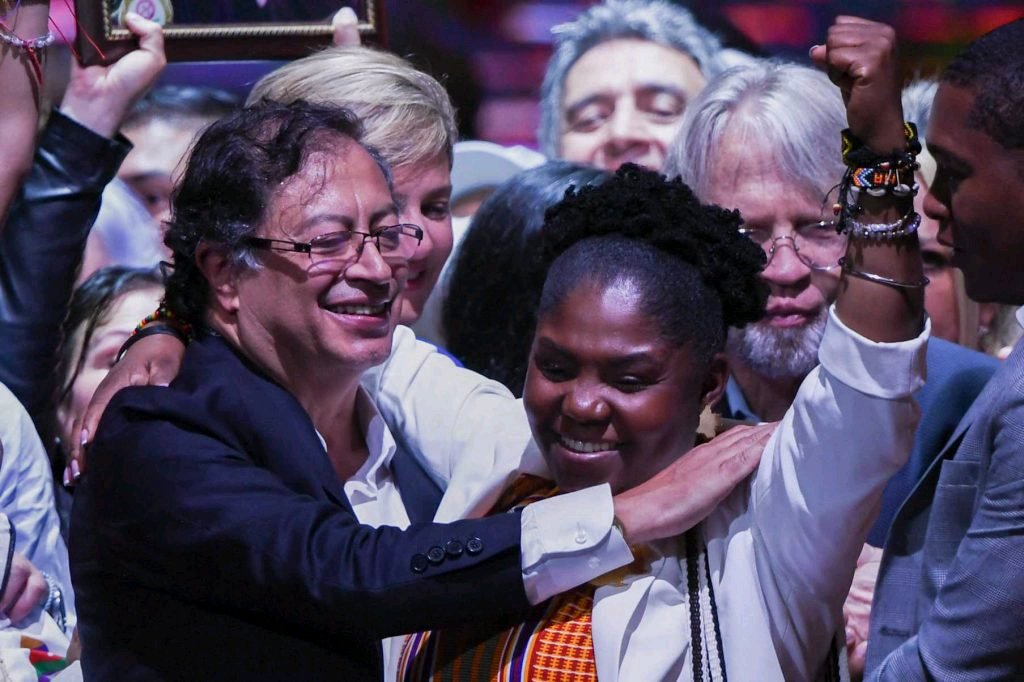There was jubilation in Colombia after the country elected Gustavo Petro as its first leftist president ever on Sunday.
The political revolution did not stop at that as they also elected the country’s first black vice president, Francia Marquez.
Marquez, a single mother, and a fiery environmentalist, worked as a maid before challenging international miners.
It was gathered that there was virtually nothing in Marquez’s past to have portrayed her chances of embarking on a political career or becoming a vice president.
Born in 1981 in a small village in the southwestern Cauca region of Colombia, she grew up with her mother. Pregnant at 16 with her first child, she was first forced to work in a gold mine a few kilometres from home to support her family. She was later hired as a maid, according to France 24.
Her victory marks a turning point in Colombia, a country that had been reportedly marred with social inequalities and historically governed by conservative elites.
On the campaign trail, she was said to have been exuberant and unabashedly dazzling. Embracing her identity, Marquez would wear her brightly-coloured Afro-Colombian garments teamed with big jewellery.
She challenged the status quo, and proposed a brighter future with politics, saying “It’s time to move from resistance to power.”
“The great challenge that all of us Colombians have is reconciliation,” the 40-year-old said upon her victory, raising her fist, and smiling.
“The time has come to build peace, a peace that implies social justice,” Marquez had said.
“I am someone who raises my voice to stop the destruction of rivers, forests, and moors. I am someone who dreams that one day human beings will change the economic model of death, to make way for building a model that guarantees life,” she had said on her website.With all votes counted, Petro, a 62-year-old former Mayor of Bogota, had won the presidential seat with 50.4 per cent to his rival, Rodolfo Hernandez’s 47.3 percent.
With Marquez as his running mate, Petro had beckoned not just a political break, but also a social movement, in a country said to have historically denied the existence of racism, of which Marquez had been a face of resistance.
Marquez’ journey, from a young, black single mother to the country’s vice presidency is extraordinary, what some described as a story of grit against the odds, ‘grass to grace.’Marquez’s environmental activism had begun early, in 1996, when she was a teenager, at age 15. Marquez became aware that a multinational company was planning to kickstart a project to extend a dam on the region’s main river, the Ovejas, which posed devastating effects on her community.
The Ovejas River campaign marked the beginning of Marquez’s long struggle to defend the rights of Afro-Colombian communities and preserve their land. For the past 20 years, she has been fighting relentlessly against the multinational companies that allegedly exploit the area around the Ovejas river and sometimes force people to leave it.
She became popular in 2014. At that time, she was targeting the illegal miners who had set up operations along the river, digging for gold and, above all, abundantly using mercury – this is usually used to separate gold from water but contaminates water and destroys biodiversity. In protest, Marquez organised a “turban march”, which saw a protest march of 80 women walking from Cauca to Bogota, a 10-day, 500-kilometre journey.
The group demonstrated in front of the interior ministry for about 20 days. In the end, the environmentalists won, as the government conceded to wipe out all the illegal farms around the Ovejas.
Marquez had bagged a law degree and had held numerous forums. She taught in higher institutions and delivered speeches before political figures. She was awarded the Goldman Prize, the equivalent of the Nobel Prize for the environment, in 2018, for her efforts. The following year, she appeared on the BBC’s list of the 100 most influential women in the world.
In central Bogota, thousands of supporters, mostly young people, rejoiced over the new change in leadership of the country.
“I’m celebrating because finally, we’re going to have a change, this shows there is hope,” academic Lusimar Asprilla, 25, told newsmen.






Leave a Reply